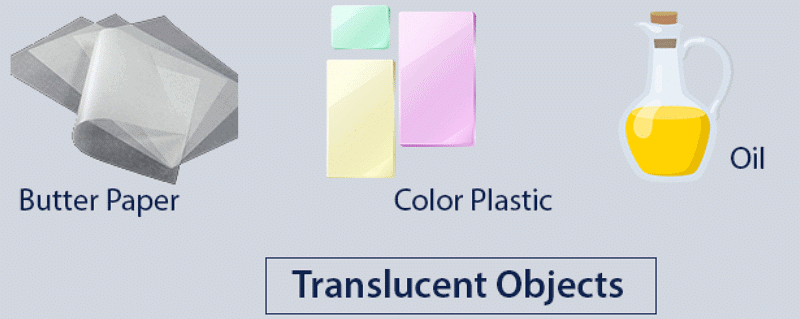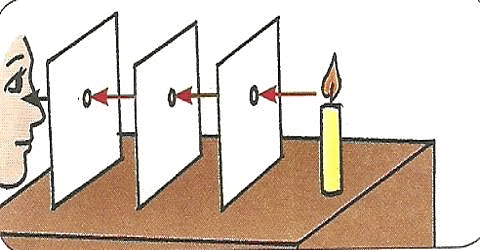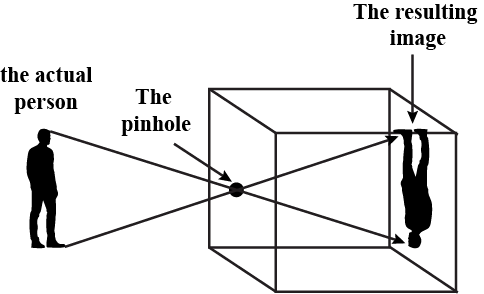Class 6 Science Chapter 8 Question Answers - Light, Shadow and Reflections
Q1: What are luminous objects?
Ans: Objects that give out or emit light of their own are known as luminous objects.

Q2: Butter paper is __________object.
Ans: Translucent
Translucent objects are those objects that allow some light to pass through them, but not enough to see objects clearly.
Q3: Give two examples of non-luminous objects.
Ans: Chair and shoe
Non-luminous objects are objects that do not produce their own light. Instead, they reflect light from other sources, such as the sun or a light bulb, to make them visible to our eyes.
Q4: What type of object is said to be transparent?
Ans: If we are able to see clearly through an object, it is said to be transparent.
Q5: Give two examples of transparent objects.
Ans: Glass and water Glass and Water are both Transparent
Glass and Water are both Transparent
Q6: Give two examples of luminous objects.
Ans: Sun and torch bulb
Luminous objects are objects that produce their own light.
Q7: What are translucent objects?
Ans: There are some objects through which we can see but not clearly. Such objects are known as translucent objects.

Q8: Wooden piece is a ___________object.
Ans: Opaque
Opaque objects are those objects that do not allow any light to pass through them, which means that they completely block or absorb light.
Q9: If we cannot see through an object at all, it is an __________object.
Ans: Opaque
If an object is described as "opaque," it means that we cannot see through it at all. When light falls on an opaque object, it does not pass through and cannot reach our eyes.
Q10: Give two examples of opaque objects.
Ans: Plastic box and wooden table
Q11: When are shadows formed?
Ans: Shadows are formed when an opaque object comes in path of light Shadow
Shadow
Q12: The shadows can be seen only on a screen. (true/false)
Ans: True
Shadows can be seen on a screen or a surface that receives light because the light rays pass through a small opening and create a shadow of the object on the surface.
Q13: By shadows, we may know about ___________ of objects. (shape/size)
Ans: Shape
Shadows are formed when an object blocks the path of light. When light from a source, such as the Sun, hits an object, it creates a shadow on the opposite side. The shape of the shadow is similar to the shape of the object that is blocking the light. By observing the shadow, we can get an idea of the shape of the object.
Q14: Why we should not look directly at sun?
Ans: We should not look directly at sun because that could be extremely harmful for the eyes.
Q15: Light travels along ___________path.
Ans: Straight

Q16: Mirror changes direction of light that falls on it. (TRUE/FALSE)
Ans: True Mirror changes Direction of Light
Mirror changes Direction of Light
Q17: We can see our face in mirror because mirror ___________our face.
Ans: Reflects
We can see our face in a mirror because the mirror reflects the light that falls on it, allowing us to see our reflection.
Q18: Images are different from shadows. (TRUE/FALSE)
Ans: True
True, images and shadows are different. Images are formed by the reflection of light, while shadows are created when an object blocks light.
Q19: __________object makes shadows.
Ans: Opaque
Opaque objects do not allow light to pass through them, so when light falls on them, they create shadows.
Q20: Stars and sun are __________source of light.
Ans: Natural
Stars and the Sun are natural sources of light that emit their own light and illuminate the surroundings.
Q21: _________objects allows light to pass through them partially.
Ans: Translucent
Translucent objects allow some light to pass through them, but not all. They create a semi-transparent effect, making objects behind them appear blurry or diffused.
Q22: Pinhole camera produces ________image.
Ans: Inverted
A pinhole camera is a simple camera that uses a small hole to project an inverted image onto a screen or surface. The image appears upside down due to the way light rays pass through the pinhole.

Q23: A sheet of polythene is ___________object. (luminous/non luminous)
Ans: Non luminous
A sheet of polythene, which is a type of plastic, does not produce light on its own, so it is considered a non-luminous object.
Q24: Clean water is __________. (transparent/translucent/opaque)
Ans: Transparent
Clean water is transparent, meaning it allows light to pass through it without scattering or distorting the light rays, enabling us to see through it clearly.
Q25: Shadows are not cast by every type of object. (TRUE/FALSE)
Ans: True
In order to cast a shadow, an object needs to be opaque or partially opaque, which means that it does not allow light to pass through it completely.
Q26: Moon is _________body. (Luminous/non-luminous)
Ans: Non-luminous
Q27: Air and water are _________.
(a) Transparent and non-luminous
(b) Opaque and non luminous.
(c) Translucent and non-luminous.
Ans: Transparent and non-luminous
Q28: What type of object is sheet of cellophane? (transparent/translucent/opaque)
Ans: Transparent Cellophane
Cellophane
Q29: Which of the following is not translucent?
(a) Fog
(b) Notebook
(c) Smoke
(d) Sheet of polythene
Ans: Notebook
Q30: ___________objects allows light to pass through them completely.
Ans: Transparent
FAQs on Class 6 Science Chapter 8 Question Answers - Light, Shadow and Reflections
| 1. What is the difference between light and shadow? |  |
| 2. How do reflections occur? |  |
| 3. Why do shadows change size throughout the day? |  |
| 4. Can you see a reflection in all surfaces? |  |
| 5. How does light travel? |  |






















